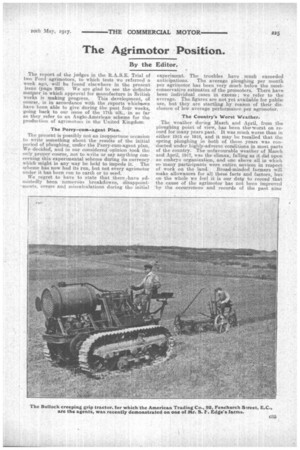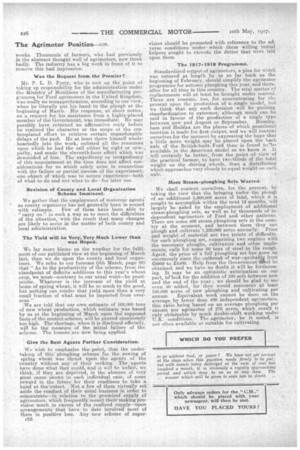The Agrimotor Position.
Page 7

Page 8

If you've noticed an error in this article please click here to report it so we can fix it.
By the Editor.
The report of the judges in the R.A.S.E. Trial of two Ford agrimotors, to which tests we referred a week ago, will be found elsewhere in the present issue (page 229). We are glad to see the definite manner in which approval for manufacture in British works is making progress. This development, of course, is in accordance with the reports whichowe have been able to give during the past four weeks, going back to our issue d the 17th ult., in so far as they refer to an Anglo-American scheme for the production. of agrimotor s in the -United Kingdom.
The Perry-cum-agent Plan.
The present is possibly not an inopportune occasion to write something about the results of the initial period of ploughing, under the Perry-cum-agent plan, We decided, and in our considered opinion took the only proper course, not to write or say anything concerning this experimental scheme during its currency which might in any way be held to impede it. The scheme has now had its run, but not every agrimotor under it has been run to earth or to seed.
We regret to have to state that there 'have admittedly been 'numerous breakdowns, disappointments, errors and miscalculations during the initial
experiment. The troubles have much exceeded
anticipations. The average ploughing per month per agrimotor has been very much below the mostconservative estimates of the promoters. There have been individual cases in excess ; we refer to the average. The figures are not yet available for public use, but they are startling by. reason of their disclosure of low average performance per agrimotor.
The Country's Worst Weather.
The weather during March and April, from the ploughing point of view,has been. theevorst on record for many years past. It was much worse than in either 1915 or 1916; and it may be tecalled that the spring ploughing in both of those years was conducted under highly-adverse conditions in most parts of the country. The unfavourable weather of March and April, 1917, was the climax, falling as it did upon an embryo organization, and one above all in which so many participants were entire, novices in respect of work on the land. Broad-minded farmers will make allowances for all these facts and factors, but on the whole we feel it is our duty to record that the cause of the agrimotor has not been improved --by the occurrences and records of the past nine
weeks. Thousands of farmers, who had previously in the abstract thought well of agrimotors, now think badly. The industry has a big work in front of it to remove this bad impression. .
Was the Request from the Premier?
Mr. P. L. D. Perry, who is now on the point of taking up responsibility for the administration under, the Ministry of Munitions of the manufacturing programme for Ford agrimotors in the United Kingdom, was un431.7r no misapprehension; according to our view, when he literally put his hand to the plough at the beginning of March. His response, at short notice, on a request for his assistance from a highly-placed member of the Government, was immediate. He may possibly have returned an affirmative reply before he realized the character or the scope ot the contemplated effort to retrieve certain unpardonable delays of the past He at least threw himself wholeheartedly into the work, enlisted all the resources upon which he had the call either by right or sym-, pathy, and made the eleventh-hour effort which was demanded of him. The expediency or inexpediency of this appointment at the time does not affect considerations for us which solely arise in connection with the failure or partial success of the experiment,one object of which was to secure experience—both of what to do and not what to do—for later use.
Revision of County and Local Organization Scheme Imminent.
We gather that the employment of motorcar agentsas county organizers has not generally been in accord with estimate. Few of them ha ye been able to "carry on" in such a way as to meet the difficulties of the situation, with-the result that many changes are likely to occur in the matter of both county and local administration.
The Yield will be Very, Very Much Lower than was Hoped.
We lay more blame on the weather for the fulfilment of our published view at the beginning of March last, than we do upon the county and local organizers. We refer. to our forecast (8th March, page 22) that "As to the productivity of the scheme, from the standpoint of definite additions to this year's wheat crop, we must—contrary to our usual wont—be pessimistic. Whatever is the increase of the yield at home of spring wheat, it will be so much to the good, but nothing can render that yield more than a very small fraction of what must be imparted from overseas."
We are told. that our own estimate of 168,000 tons of new wheat production, which estimate was based by us at the beginning of March upon the` supposed facts of the control scheme, will be proved enormously too high. The-shortage, when it is disclosed officially, will be the measure, of the initial failure of the scheme. The lessons are now being applied.
Give the Best Agents Further Consideration.
We wish to emphasize the point, that the undertaking of this' ploughing scheme for the sowing of spring wheat was thrust upon the agents of the -country without any of their seeking. The -agents. have done what they could, and it Will be unfair, we think, if they are deprived, in the absence of very goad CallSc shown in each individual case, of some reward in the future for their readiness to take a hand at the 'outset. Not a few ofthem virtually set aside the conduct of their usual business in order to concentrate—in relation to the promised supply of agrimotors, Which frequently meant theiimaking provision much in excess of the realized supply—upon arrangements' that have to date involved most of them in positive loss. Any new scheme of super
vision should be promoted with reference to the ad. verse conditions • underwhich these willing initial helpers sought to ekecute the duties that were laid upon them.
The 1917-1918 Programme.
Standardized output of agrimotors, a plea for which was entered at length by Us so tar back as the beginning of February, should simplify the agrimotor programme for autumn ploughing this year, and there-after-for all time in this country. The vital matter ef replacements will at least be brought under control-. There are reasons, too, for concentrating forthe present upon the production, of a single model, but we think that any such decision will be pushing standardization to extremes, although much can be said in favour of the production of a single type. between now and August or September. Birmingham and Halifax are the places of Which prominent mention is made for first output, and we will content ourselves for the moment by expressing the hope that a little more weight .may be placed upon, the back axle of the British-built. Ford than is found to"be available in the American .model as we know it. It will certainly be better, from the point of view of the jk.aictical farmer, to have two-thirds of the total weight on the . driving wheels, • than g distribution which approaches very closely to equal weight on each axle.
More Steam-ploughing Sets Wanted.
We. -shall _content ourselves, for the present, bytaking the view that the bringing under the plough of anadditional3,000,000 acres of land, which it is sought to accomplish within the' next 12 months,' will largely be aided by the employment of additional steam-ploughing sets, as well as by thousands of in-. dependent agrimotors of Ford and 'other patterns. There are some 400 steam-ploughing sets in the country at the moment, and between them they can plough and cultivate 1,250,000 acres annually. Price and weight of material are two points -of -difficulty, for each ploughing set, comprising two engines with the necessary ploughs, cultivators and other implements, calls for some 50 tons of steel in the rough. Again, the price of a full ploughing set has gone up enormously since the outbreak of war—probably from
£2900 to 14400. Help from the Government be obtained, and we have no doubt it will be forthcoming. It may be an optimistic anticipation on our part, to-look for the addition of 100 sets between now and the end of the year ; we should be glad to see even 50 added, for they would represent at least 150,000 acres of new ploughing and cultivating per annum. Equivalent work cannot be done on the average by fewer than 400 independent agrirnotors, this ratio being based on an average ploughing per 'annum per agrimotor of 375 acres, which result is only obtainable by much double-shift working under T_T.K. conditions. The agrimotor; be it noted, is not often available or suitable for cultivating.






















